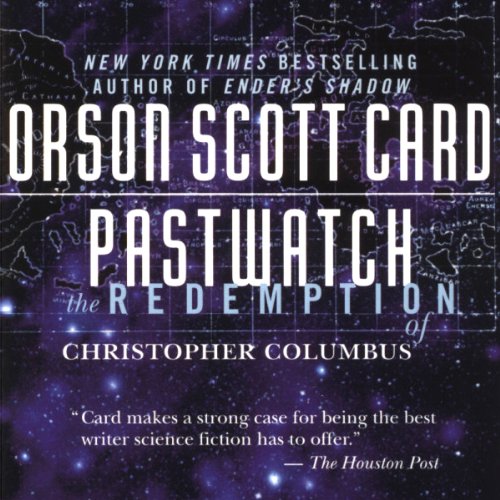
Pastwatch
The Redemption of Christopher Columbus
Failed to add items
Add to basket failed.
Add to Wish List failed.
Remove from Wish List failed.
Follow podcast failed
Unfollow podcast failed
Buy Now for $28.99
No valid payment method on file.
We are sorry. We are not allowed to sell this product with the selected payment method
-
By:
-
Orson Scott Card
About this listen
In one of the most powerful and thought-provoking novels of his remarkable career, Orson Scott Card interweaves a compelling portrait of Christopher Columbus with the story of a future scientist who believes she can alter human history from a tragedy of bloodshed and brutality to a world filled with hope and healing.
©1996 Orson Scott Card (P)2005 Blackstone Audio, Inc.Critic Reviews
What listeners say about Pastwatch
Average Customer RatingsReviews - Please select the tabs below to change the source of reviews.
-
Overall5 out of 5 stars
-
Performance4 out of 5 stars
-
Story5 out of 5 stars
- Amazon Customer
- 13-10-2022
Superb story creation and telling!
The strength of the storyline is exceptional. The mastery of writing is as strong today as when I came to Orson Scott Card’s works as a teenager first exploring Science Fiction. Though disappointing in some of the reading the performances do not take away from the compelling, daring and hopeful narrative. Characters are so real and believable in a world we might dare to wish for. Concepts which do not dwell or delve too much into what creates the world we live in but still gives the basis for the world we are. Cannot recommend highly enough.
Something went wrong. Please try again in a few minutes.
You voted on this review!
You reported this review!
-
Overall5 out of 5 stars
-
Performance4 out of 5 stars
-
Story4 out of 5 stars
- Paul Whittaker
- 18-05-2022
Great story, but requires suspension of disbelief
Like the vast majority of Card's works, this is a great story, and well executed. But because it references the real world, it suffers from credulity problems in several places. Card's usual formula of carefully secular humanism doesn't work when real-world religion is mentioned.
My main problem is that the reader is not permitted to look at the huge elephant in the room. What is the very first thing that an organisation like PastWatch would have done? They would, of course, have examined the true events of the life of Jesus Christ, and every other person mentioned in the religious texts of major religions. But this is untouchable, and therefore, for the first time that I can recall in his writings, exposes Card's Mormon/Christian bias. We're allowed to see an imagined truth about Noah and Atlantis, but that is all. Islam is given only lip service in the form of Kemal.
Despite heroic efforts, I don't buy Hunahpu's theory that the Americas could have posed any threat to Europe had they been left alone. Political and social reform? Likely. Adavanced metallurgy? Possible. Gunpowder and ocean-going vessels? Very unlikely. Force projection onto Europe, with a history of naval and siege warfare involving cannons, and at the end of a very long supply chain? Nonsense. But I nonetheless enjoyed the argument regarding causality versus time.
I'm also not buying Cristobal Colon's extremely unlikely conversion to early 20th century social norms, and the lost future's failure to favour other radical options for human survival (e.g. orbital or submarine habitats) over the extreme risk of playing God with the past with almost certain unforeseen outcomes.
That said, it was a great Humanist tale, albeit unavoidably Christian-biased, with an outcome that few could object to on purely secular grounds.
With regard to the presentation, I didn't much like the female voice actors - too youthful in Diko's reader's case, and with too much obvious reader emotional bias in the case of Tagiri's reader. The Native American reader (aside: why "Indie" rather than "Native American"?) read too fast and with too little inflection. Stefan Rudnicki was excellent as always.
Something went wrong. Please try again in a few minutes.
You voted on this review!
You reported this review!


